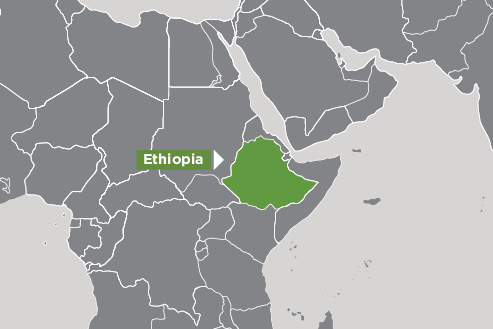Overview
This project aims to protect and increase the productivity of lentil crops in the mid-highlands of Ethiopia by delivering the solutions needed by smallholders growing lentils in the cereal-based cropping systems of Ethiopia such that they maintain and improve their current lentil cropping practices, their cereal crops, and their livelihood.
In the mid-highlands of Ethiopia, lentil is one of the foundational legume rotation crops for 600,000 households dependent on cereal-based farming systems (wheat, barley and tef). In the Ethiopian lentil breeding program, there is limited crossing where mostly the parents are exotic sources.
Demand for lentil has to be met by domestic or international production and a ready market for the product exists. New problems (such as diseases) need addressing through knowledge development. Agronomic and genetic solutions to the problems are plausible but have to be researched and tested. An impact pathway based on improved varieties is not without challenges, but seed is an effective vehicle to deliver innovation, and has a sound track record in Ethiopia. The Ethiopian extension system is reputed to be one of the best in Sub-Saharan Africa and has been effective at promoting innovation.
Expected project outcomes
- Mobilising the best expertise in Australia and ICARDA to support lentil breeding and pathology researchers at EIAR.
- Providing germplasm with high level of resistance to target diseases.
- Establishing sustainable disease management, thereby restoring resilience of a farming system under threat from diseases of lentil.
- Capacity buiding by enhancing the skills of individual Ethiopian researchers and their organisations in disease aetiology, epidemiology, molecular biology, plant pathology, applied biometry, plant breeding and farming system analysis.
Summary of outcomes to date
2022–22
- The sustainability of wheat-based cropping system in Ethiopia, where lentil plays a key role as a rotation cash crop, has recently been threatened by new and emerging viruses and fungal diseases, previously minor, which severely affected lentil crops in 2017-18 and 2018-19 seasons. Lentil diseases of concern include viruses, fungal soilborne root rots, wilts, fungal foliar diseases, and complexes of different diseases.
- The project is mobilising the best expertise in the International Center for Agricultural Research in the Dry Areas (ICARDA), the New South Wales Department of Primary Industries (NSW DPI) and the University of Western Australia (UWA), to support lentil breeding and pathology researchers at the Ethiopian Institute of Agricultural Research (EIAR) and Ethiopian Agricultural Research Institutes (IARI). It will enhance the skills of individual Ethiopian researchers and their organisations in disease etiology, epidemiology, molecular biology, plant pathology, applied biometry, plant breeding and farming system analysis.
- The project started activities in 21-22, with disease surveys and screening for resistant germplasm.
- Evidence obtained by the project will enable end users to take appropriate and immediate actions to manage the diseases. This will be achieved through strong focus towards pre-existing, traditionally known practices (date and density of sowing, crop rotations, choice of preferable fields and soils, tillage practices, fertilizer regime, crop protection sprays). These options can be quickly developed and deployed singly or in combinations, possibly associated with existing and/or new varieties, as and where shown to provide significant disease control. The project will integrate any varietal development with good agronomic practices towards enhancing resilience in Ethiopian lentil farming systems.
- Better management of diseases will result in lower production risks, reduced production losses, and a better return on labour and inputs from profitable lentil crops with yield stability secured in the long term.





